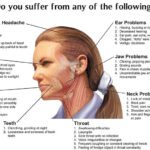For a lot of people with the temporomandibular joint issue (TMJ), the condition can be controlled without enduring effects. Without treatment, nonetheless, TMJ may cause chronic arthritis, repeating migraines and other unpleasant impacts.
TMJ Effects and Causes
The impacts of TMJ, and the period they linger depend generally on the cause of the condition. In broad terms, most TMJ signs are caused by physical strain on the temporomandibular joints and different tissues of the jaw and the skull, including nerves and muscles.
Dental Risks
Qualified dental practitioners often treat temporomandibular joint issue since it is fundamentally caused by a bad bite. A few things can be responsible for a bad bite, but simply living with the pain can make additional dental problems, including:
- untimely wear and tear because of teeth grinding or clenching
- Worn enamel
- Fractured teeth
- major tooth pain
- Jaw dislocation
- uneven facial swelling
- Locked Jaw
Since clenching your teeth and gritting your jaw can wear out your teeth enamel, you might be more prone to gum disease, tooth decay, and plaque buildup.
Medical Risks
TMJ can cause a lot of pain that can rapidly go up from mild to horrendous. This issue can cause a heap of therapeutic issues when left untreated, including:
- Depression
- Insomnia
- Malnutrition
- Vertigo
- Tinnitus
- Migraines
- Headaches
- Vision impairment
There are various factors that may add to this strain, including:
- List item
- A bad bite situation
- A poorly aligned jaw
- teeth grinding or bruxism
- Osteoarthritis and other types of degenerative diseases
- injury or trauma to the jaw
It ought to be noticed that not every person who suffers from one of these conditions have TMJ. Now and again, the signs related with TMJ—which incorporate jaw uneasiness, and trouble biting and chewing—are transitory; in different examples, they get worse.
TMJ Without Treatment
TMJ isn’t a life-threatening disease, however, in the event that not treated its side effects can adversely affect your life after some time.
One of the most commonly reported indicators of TMJ is jaw clicking. Other forms of constant discomfort associated with TMJ include:
- severe headaches
- back, neck and shoulder pain
- ringing in the ears or Tinnitus which could be coupled with ear pain
TMJ has additionally been linked to depression. An examination demonstrated that anxiety and depression ought to be considered risk factors for TMJ, and the chronic character of TMJ in several individuals can spoil mood and sleep, and add to depression.
When Should You See a Neuromuscular Dentist?
A few patients live with the difficult, yet unclear, symptoms not realizing that treatments are accessible.
Dental specialists in neuromuscular dentistry have done extensive studies in the connection between the nerves, joints, muscles, and different parts that assistance in jaw functioning. Knowing how these parts work together is critical to diagnosing the root cause of TMJ and preparing a custom treatment program. Most TMJ treatments are noninvasive and painless.









